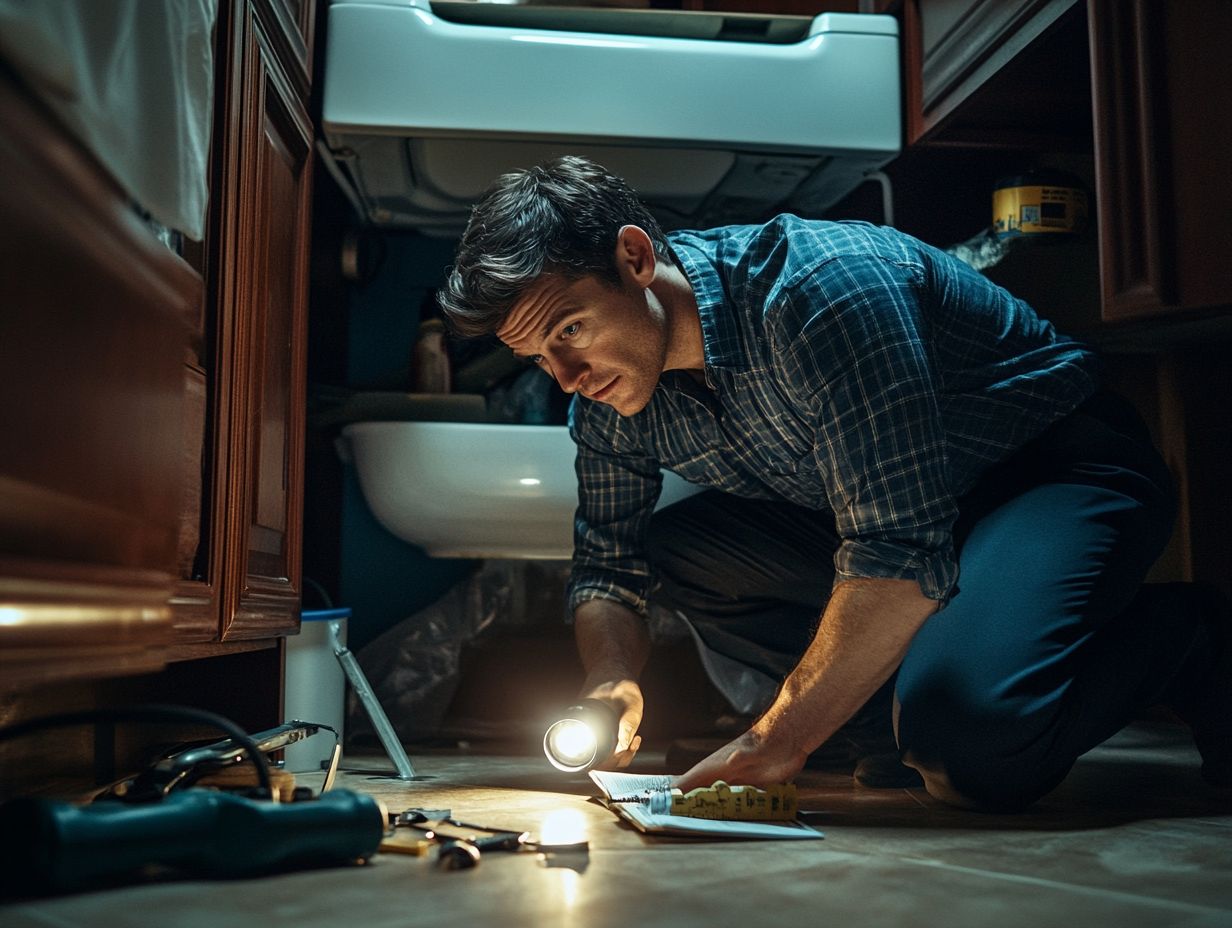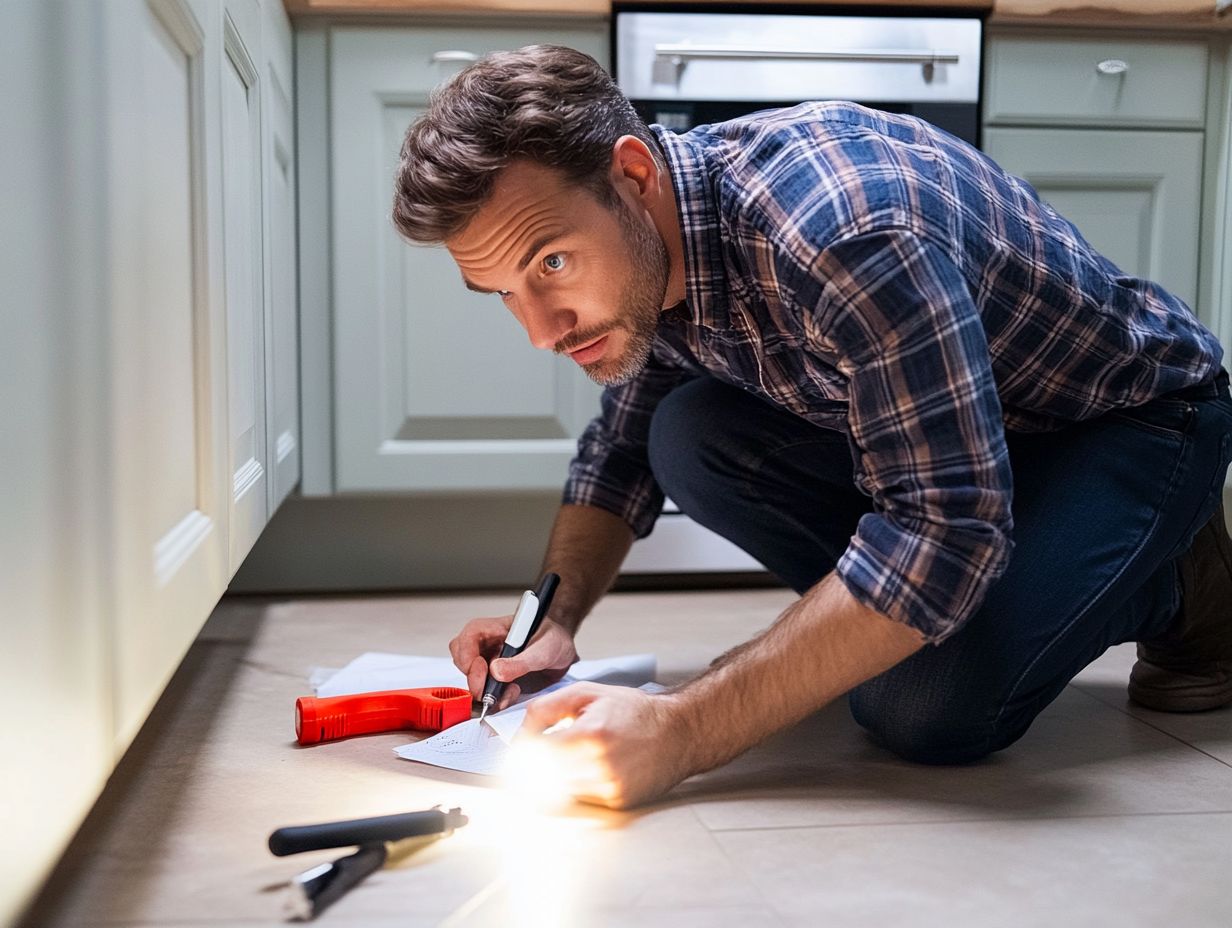
The Ultimate Guide to Home Inspections: What to Expect
When buying or selling a home, understanding the home inspection process is crucial.
This guide breaks down everything you need to know, from what a home inspection entails to how to prepare for it.
We explore the key roles of home inspectors, common issues they uncover, and the steps to take after receiving your inspection report.
By the end, you will be equipped with insights that will empower you to navigate the home inspection landscape with confidence.
Understanding Home Inspections

A comprehensive understanding of home inspections is crucial for both buyers and sellers in the real estate market, as it represents a vital step in assessing home buying eligibility. This process provides potential buyers with essential insights into the condition of a property prior to making a significant investment.
Home inspections have the capacity to uncover serious issues pertaining to structural components, HVAC systems, plumbing, and electrical systems. The information obtained from these inspections can significantly impact the final sale price and inform negotiation strategies.
What is a Home Inspection?
A home inspection is a comprehensive evaluation of a property’s condition, typically conducted by licensed and certified inspectors. These professionals assess various structural components, including HVAC systems, plumbing, and electrical systems, to identify potential issues and ensure the safety of future homeowners.
The process entails a meticulous examination of both the interior and exterior of the home, concentrating on vital systems that contribute to the property’s overall functionality and safety. Home inspectors are generally required to complete specialized training and obtain relevant certifications, which equip them with the expertise necessary to recognize defects that may be overlooked by individuals without professional training.
The resulting home inspection report is an essential tool in the home buying process, detailing findings related to the condition of the roof, the stability of the foundation, and the presence of mold or pests. This crucial document not only assists buyers in making informed decisions but also facilitates negotiations between the buyer and seller, ultimately guiding both parties toward a satisfactory agreement.
Why Home Inspections Matter
Home inspections play a crucial role in the real estate process by safeguarding potential buyers from significant issues that may arise after the purchase of a property. They provide essential negotiation leverage by identifying safety concerns and defects that may not be apparent during a standard walkthrough.
This comprehensive assessment can uncover hidden problems such as structural damage, electrical hazards, or plumbing failures, which could result in considerable repair expenses if not addressed promptly. When such issues are brought to light, they can substantially influence negotiations, enabling buyers to request necessary repairs, modify their offers, or even withdraw from a transaction that no longer appears advantageous.
Inspection contingencies in purchase agreements grant buyers the right to address these findings with the seller prior to finalizing the purchase. Proactively addressing safety concerns mitigates future liabilities, thereby protecting the buyer’s investment and ensuring that their new residence is both secure and sound.
How Home Inspections Work
The home inspection process entails a systematic evaluation conducted by licensed and certified inspectors, who employ a comprehensive inspection checklist to assess various aspects of the property, including its structure, systems, and overall safety. This inspection typically requires a few hours to complete, depending on the size and condition of the home.
During the inspection, the inspector will thoroughly examine critical components such as the roof, foundation, plumbing, electrical systems, as well as insulation and ventilation. Common issues that may be identified during this process include leaks, mold growth, or outdated wiring, all of which can impact both safety and property value. It is not uncommon for this detailed examination to take anywhere from two to four hours, depending on the complexity of the property.
Potential buyers are strongly encouraged to attend the inspection, as their presence allows them to gain firsthand insights and address any concerns directly with the inspector. This engagement ultimately facilitates knowledge-based decision making regarding their prospective investment.
The Role of a Home Inspector
The role of a home inspector is to conduct an impartial and comprehensive evaluation of a property’s condition by identifying potential issues and documenting findings in a detailed home inspection report. This process ultimately aids buyers in making informed decisions.
Professionals in this field are generally required to obtain relevant certifications and licenses, which ensure they possess a thorough understanding of building codes, structural integrity, and safety regulations. Their responsibilities extend beyond mere observation; they conduct meticulous examinations of various components, including roofing, foundations, plumbing, and electrical systems.
The importance of their objective assessment cannot be overstated, as it enables prospective buyers to make informed choices based on the true condition of the property. A thorough home inspection report, often supplemented with photographs and detailed explanations, serves as an invaluable resource, providing clarity and reassurance as buyers navigate one of the most significant investments of their lives.
Key Areas and Systems Evaluated During an Inspection
During a home inspection, several key areas and systems are meticulously evaluated, including structural components such as the foundation and roof, as well as essential systems like HVAC, plumbing, and electrical systems. These evaluations are critical in determining the overall safety and functionality of the property.
Inspectors pay particular attention to the foundation, as any cracks or shifts can lead to significant structural concerns and negatively impact property value. Roof inspections aim to identify signs of wear, leaks, or improper installation, which could result in costly repairs if not addressed promptly.
HVAC systems are assessed for efficiency and functionality, ensuring effective temperature regulation without incurring excessive energy costs. Plumbing inspections focus on uncovering leaks or outdated materials that may lead to water damage or mold.
A comprehensive assessment of the electrical system is essential to prevent potential hazards, such as short circuits or fire risks, thereby safeguarding occupants and enhancing the property’s marketability.
Preparing for a Home Inspection

Preparing for a home inspection is essential for both buyers and sellers. For buyers, it provides a clear understanding of their eligibility in the home-buying process.
For sellers, it serves as a final opportunity to address any issues prior to the inspection, which can significantly influence overall inspection costs and subsequent negotiations.
Choosing the Right Home Inspector
Selecting the appropriate home inspector is a crucial step for prospective buyers. It is essential to seek licensed and certified inspectors who possess favorable reviews and have a thorough understanding of the local area to ensure an accurate and reliable evaluation of the property.
When in search of a home inspector, potential buyers should thoroughly examine the individual’s credentials and experience. This includes verifying relevant certifications and determining whether the inspector is a member of professional associations that maintain industry standards.
Engaging inspectors with extensive experience in the local housing market is advantageous, as they can identify common issues that may be overlooked by individuals unfamiliar with the area. Reviews from prior clients can offer valuable insights into an inspector’s professionalism and meticulousness, thereby instilling confidence in the buyer’s decision.
Local expertise not only aids in recognizing region-specific concerns, such as pest-related issues or weather-induced damage, but also enables buyers to make well-informed decisions regarding the property under consideration.
What Sellers Should Do Before the Inspector Arrives
Ahead of the arrival of the inspector, it is essential for sellers to take proactive measures, as this represents a final opportunity to address any potential issues. Utilizing an inspection checklist to rectify common problems can significantly influence the outcome of the home inspection.
Investing time to conduct a thorough evaluation of the property and make necessary repairs can mitigate the possibility of unexpected findings during the inspection. For instance, sellers should inspect for leaky faucets, faulty electrical wiring, or concerns related to the roof and furnace, as these are common red flags that inspectors frequently identify.
Moreover, effectively cleaning the home, decluttering spaces, and organizing areas such as the basement and garage can create a favorable impression of a well-maintained property. By addressing these concerns in advance, sellers not only enhance the visual appeal of the home but also improve the likelihood of a smoother inspection process, which could facilitate a quicker sale.
Tips for Homeowners Preparing for an Inspection
Homeowners preparing for an inspection should ensure that the property is accessible and well-maintained, with particular attention given to areas that may present safety concerns. It is advisable to encourage potential buyers to attend the inspection, as this allows them to gain firsthand insight into the inspector’s findings.
Taking proactive measures, such as decluttering spaces, addressing minor repairs, and providing unobstructed access to attics and crawl spaces, can significantly enhance the efficiency of the inspection process.
When buyers are present during the inspection, it enables them to engage in meaningful discussions with the inspector, allowing them to ask questions directly and receive clarification on any immediate concerns.
This level of transparency not only fosters trust between the parties involved but can also help mitigate potential disputes in the future. Buyers who observe the inspection process are likely to feel more confident in their purchasing decision, contributing to a smoother closing process and an improved overall experience for both homeowners and buyers.
What to Expect During the Inspection

On the day of the inspection, buyers can anticipate a thorough examination of the property, during which common issues will be identified and documented.
This process enables the inspector to compile a comprehensive inspection report that outlines any significant problems requiring attention prior to the finalization of the sale.
Common Issues Found During Home Inspections
Common issues identified during home inspections frequently include significant concerns such as mold, electrical deficiencies, and plumbing leaks. These problems can have a considerable impact on the home inspection report and offer critical negotiation leverage for buyers.
Such findings not only present health and safety risks but can also result in expensive repairs that may impose a financial burden on the buyer. For example, the presence of mold may indicate underlying moisture problems that necessitate extensive remediation, while electrical deficiencies could violate safety codes, thereby posing potential hazards.
When buyers encounter these issues, it is essential for them to approach negotiations with a strategic mindset. They may consider requesting repairs or negotiating a reduction in the sale price to account for anticipated costs. Additionally, obtaining estimates from licensed contractors in advance can provide further justification during negotiations, thereby strengthening their position and making their requests more compelling and well-informed.
Importance of Attending Your Home Inspection
It is essential for buyers to attend their home inspection, as this allows them to gain direct insights into the property’s condition, pose questions, and comprehend the findings presented in the home inspection report. This engagement can significantly augment their negotiation leverage during the purchasing process.
Being physically present during the inspection facilitates effective communication with the inspector, enabling buyers to receive immediate feedback and clarification on any observed issues. This interaction not only aids buyers in understanding the significance of specific findings but also enables them to express their concerns directly, leading to more knowledge-based decision making.
Attending the inspection presents an invaluable opportunity to acquire knowledge about necessary repairs and maintenance recommendations from the expert. Ultimately, this involvement ensures that buyers feel confident and well-informed as they navigate the complexities of homeownership.
After the Home Inspection
Following the home inspection, it is essential for buyers to thoroughly evaluate the home inspection report. This review will help identify any significant issues that may necessitate negotiation for repairs or concessions.
Additionally, it is important to consider potential follow-up costs related to the required repairs.
Reading and Understanding the Inspection Report

Reading and understanding the inspection report is essential for buyers, as it outlines significant issues and common problems identified during the inspection. This report serves as a foundational tool for negotiating repairs and engaging in further discussions with the seller.
By thoroughly reviewing the report, buyers can pinpoint critical areas such as structural integrity, electrical systems, plumbing, and roofing conditions. Each section typically contains detailed descriptions and images that emphasize problem areas, facilitating a clearer understanding of the extent of any necessary repairs.
Familiarizing oneself with the common terminology used in the report can enable the buyer to articulate specific concerns effectively. This knowledge becomes invaluable during negotiations, enabling informed discussions about repair responsibilities and pricing. Ultimately, it guides buyers toward making a confident decision regarding the property’s overall value and safety.
Negotiating Repairs and Concessions with Sellers
Negotiating repairs and concessions with sellers is a critical step for buyers following a home inspection, particularly when serious issues are identified in the inspection report. This provides buyers with significant leverage to negotiate adjustments to the sale price or request necessary repairs prior to finalizing the agreement.
To navigate this process effectively, it is imperative for buyers to conduct a thorough review of the inspection findings, categorizing issues based on their urgency and potential impact on safety or livability. Clear and respectful communication with the seller is essential, as articulating concerns in a professional manner can foster a cooperative atmosphere.
By distinguishing between non-negotiable repairs and those that can be addressed at a later time, buyers can approach negotiations in a strategic manner. Leveraging the inspection report as a solid foundation, buyers can make informed requests, ensuring that their demands remain reasonable while effectively reinforcing the rationale for any concessions sought.
This approach not only strengthens their negotiating position but also demonstrates a commitment to achieving a fair resolution.
Next Steps After a Home Inspection
Upon completing a home inspection, potential buyers should delineate their subsequent actions based on the findings, particularly addressing any significant issues that may have emerged and assessing how these factors will impact their home buying process moving forward.
Initially, it is imperative for buyers to meticulously review the inspection report, identifying which concerns necessitate immediate attention and which may be classified as minor or cosmetic. This evaluation not only facilitates the prioritization of essential repairs but also assists in developing a strategy for negotiations with the seller.
Maintaining open communication with their real estate agent is crucial, as the agent can offer valuable insights and guidance regarding the optimal approach to the situation. Together, buyers can explore potential remedies, such as requesting repairs, negotiating a price reduction, or considering alternative options, thereby ensuring they remain proactive and well-informed throughout their decision-making process.
Addressing Serious Issues
Addressing significant issues identified in the home inspection report is crucial for buyers, as these concerns can impact safety and comfort while potentially incurring substantial follow-up costs if left unaddressed. Therefore, it is essential to engage in effective negotiations with the seller to facilitate necessary repairs.
To navigate this important phase efficiently, buyers should first prioritize the inspection findings by differentiating between major repairs and minor concerns. They should compile a comprehensive list of the identified issues, accompanied by estimates from contractors regarding expected repair costs. Equipped with this information, buyers can approach the seller with confidence, presenting not only the inspection report but also the estimated costs for the necessary repairs, which can serve as a compelling point during negotiations.
Evaluating the significance of each issue in relation to the overall condition and value of the property is vital in determining whether to proceed with the purchase or withdraw. This careful assessment ensures that buyers make informed decisions that align with their best interests.
Using the Inspection as a Home Improvement Guide
The home inspection serves as a valuable home improvement guide for buyers, highlighting common issues that require attention and providing insights into future maintenance needs to enhance the property’s longevity and safety.
By thoroughly analyzing the inspection report, homeowners can discern which repairs or upgrades should take precedence, taking into consideration factors such as safety, energy efficiency, and their overall impact on property value. For example, if the inspection identifies outdated electrical systems, prioritizing these upgrades can mitigate potential hazards and possibly lower insurance costs.
Developing a budget that allocates funds for both immediate repairs and long-term maintenance is essential to ensure that necessary projects remain financially manageable. Additionally, establishing a timeline for completing these tasks, while staggering them based on urgency and available resources, will help maintain the home’s condition and enhance its overall appeal.
Frequently Asked Questions
Common inquiries regarding home inspections typically focus on critical subjects, including the standard duration of an inspection, the severity of potential issues that may be identified, and the role of these inspections within the broader context of the home buying process.
Such information is vital for both buyers and sellers to make informed decisions.
How Long Does a Home Inspection Take?
The average duration of a home inspection typically ranges from two to four hours, influenced by various factors including the size and condition of the property. Additionally, the thoroughness of the inspector and the complexity of the systems being evaluated also contribute to the overall length of the inspection.
For example, larger homes or properties with intricate systems such as multiple HVAC units, swimming pools, or unique architectural features may necessitate additional time for a comprehensive assessment. Furthermore, an inspector’s level of experience can significantly impact their efficiency; seasoned professionals are often able to conduct assessments more swiftly due to their familiarity with common issues.
This variability in inspection duration can affect scheduling logistics for buyers, as they may need to adjust their availability based on whether the inspection extends beyond the anticipated timeframe. Recognizing these factors can assist buyers in planning effectively, ensuring their presence during the inspection to address any immediate concerns or inquiries.
What if Major Problems Are Found During the Inspection?
If significant issues are identified during the home inspection, it is imperative for buyers to be prepared to negotiate repairs or concessions with the seller, utilizing the inspection findings as leverage to address critical matters that may affect the property’s safety and overall value.
Comprehending the importance of these findings is essential, as it often marks a pivotal moment in the purchasing process. Buyers should consider compiling a comprehensive list of the issues noted during the inspection, as this documentation is crucial for effective negotiations.
When discussing potential remedies with the seller, demonstrating an understanding of the costs and implications associated with the repairs can enhance the buyer’s negotiating position. Involving a real estate agent during this phase can be particularly beneficial, as they possess the expertise required to facilitate discussions, propose realistic solutions, and navigate the complexities of the negotiation process, thereby ensuring that the buyer’s interests are adequately represented.





